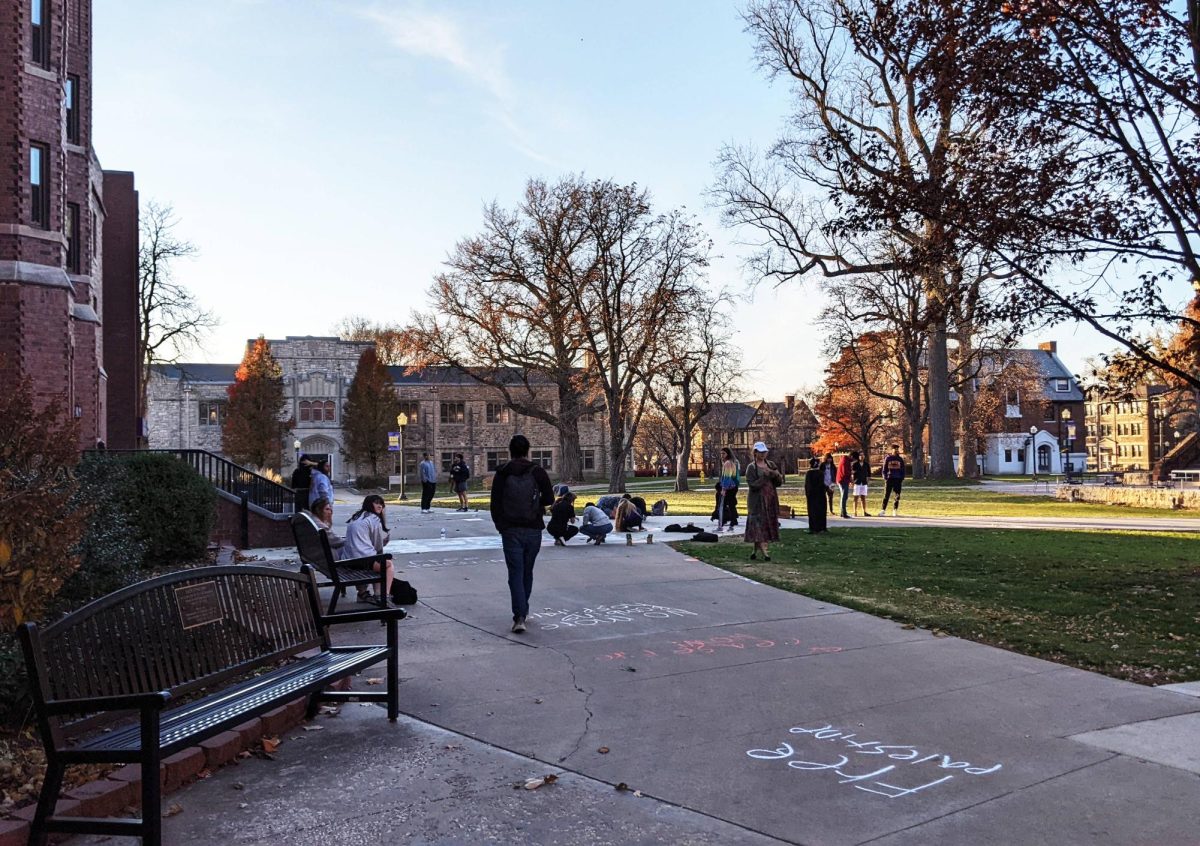
Teagan Springer & Marin Hart
Students drawing Pro-Palistine messages with chalk on the sidewalk outside Seymour Union
The day after an event intended to advocate for a ceasefire in Palestine, chalk messages were purposefully washed away by Knox College grounds staff with no explanation or warning from administration – leaving organizers and attendees of the event frustrated and confused as to what prompted the power washing.
Last November, dozens of students gathered in Seymour Lounge to attend this event, followed by drawing peaceful messages and symbols in chalk on and around Plomin Terrace.
The protest went smoothly from the perspectives of the organizers, seniors Teagan Springer and Marin Hart, but their satisfaction quickly turned to confusion and frustration when the chalk messages were power washed away the next morning.
One attendee, senior Amira Siddique, received a picture from a friend of the chalk being washed away.
“The immediate thought is that you’re silencing your students’ voices. I was hoping that maybe something was defaced or some other reason, but my immediate thought was just to clear it up and find out what happened,” Siddique said.
Siddique promptly sent an email to administration asking for an explanation. An hour later, she met with Vice President of Student Development Dr. MarQuita Barker.
“The messages written in chalk on the sidewalk were washed away because they were defaced,” said Dr. Barker. “A couple of students asked why the entire drawing was washed away and not just the part that was defaced. I imagine it would be hard to wash off some chalking without impacting the rest of it.”
Why erase everything when it was one problematic message, so far from the rest of the messages, Siddique wondered.
“I asked Dr. Barker to send out an email to the student distribution list explaining why they washed away the chalk, because everyone thought administration was silencing students’ voices when they say they were actually just trying to protect us,” Siddique said.
Later that afternoon, the same day the chalk was washed away, students returned to re-chalk their art and messages. These were not removed. The school does not currently have any policy against chalking.
The event was in response to the current increase in conflict between Israel and Hamas began after an attack Hamas committed on Israel on Oct. 7. Israel responded by firing rockets at Palestine, focusing most of their firepower on the Gaza strip.
Following these events, Springer and Hart expected some response from the student body, but after little to no activity on campus, they decided to collaborate on an event.
“We need education, to know where to put our resources, but we also need political action. I talked to some people who were pro-activity but did not have the capacity to do anything,” said Hart. “We had email templates to send to representatives to demand a ceasefire. Then we made calls using 5Calls. […] We then encouraged people to send those links to their friends and family.”
Ahead of the event, Springer and Hart put up posters around campus, advertised on Instagram, and prepared an informational slideshow to present.
“We had several conversations about doing an event responsibly, how we could mitigate any harm,” Hart said. “We’re never going to know everything, but we can’t let fear of making a mistake keep us from action.”
Driven by their desire to call for a ceasefire, Hart and Springer moved forward with planning the event, which dozens of students ultimately attended. At least 33 were in the room calling, emailing and faxing their representatives, and more joined to write chalk messages during the second half of the event.
“People were talking and laughing, just being together. That was something I felt like had been missing on campus. People are confused, grieving, upset about this war. To hear people’s chatter and laughter was really nice,” said Hart.
Prior to the chalk writing, Springer and Hart discussed with attendees that this was not a place for “hateful messaging”, and to keep chalk art peaceful and resourceful.
Soon after, most Knox students left for winter break, but without any widespread explanation or understanding as to what exactly had happened with the chalk being erased.
The topic was soon brought up again, however, at the student forum held on Jan. 10, when Springer and Hart, joined by several other students, brought a statement asking administrators to clear up the thought process and events that led to the power washing.
Specifically, they requested that the college condemn expressions of islamophobia and anti-setmitism on campus, continue to engage the subject of the conflict in the form of educational talks and panels, hold open spaces for dialogue, and provide support to students directly affected.
Following the forum, Siddique felt that the issue had been explained more clearly.
“I do think there was some miscommunication, or lacking communication entirely, but in the forum they were very responsive to our requests and we did not feel that they were trying to silence us,” Springer said.